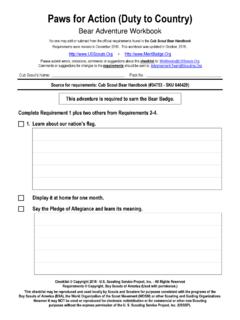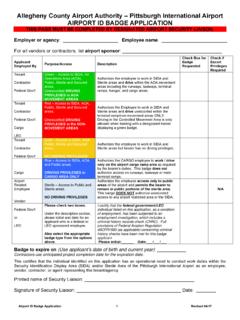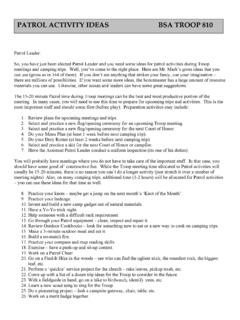Transcription of Although in some parts of the British Isles Scout Counties ...
1 Although in some parts of the British Isles Scout Counties are known as Areas or Islands and in one case Bailiwick for ease of reading this publication simply refers to County/ Counties . In Scotland there is no direct equivalent to County or Area, and Scouting is organised into Districts and Regions, each with distinct responsibilities. Some County functions are the responsibility of Scottish Regions, while others lie with Scottish Districts. The focus of responsibility is outlined in Scottish Variations from POR. The equivalent role to County Training Manager in Scotland is the Assistant Regional Commissioner (Adult Training). For ease of reading this document refers to County Training Manager, except where there is a practical difference between the two roles, in which case this is indicated.
2 The term Training Manager is used to refer to those in The Scout Association who are responsible for managing training provision, including: County/Area Training Manager, Local Training Manager, Assistant Regional Commissioner (Adult Training) Scotland and Assistant District Commissioner (Adult Training) Scotland. Again, for ease of reading, all adults taking part in the Training Scheme are referred to as learners. Please note the deliberate order of the modules which are listed within this document. The modules have been put into groups to assist learners and Training Advisers to identify and prioritise learning whilst still allowing flexibility based on individual learning needs. We note the importance of Delivering a Quality Programme (12A) and have therefore prioritised this module above others in the Training for All Appointments group.
3 The module numbers are indicated in brackets at the end of the title to help track the modules on Compass and match them to existing documents. About this Guide .. 7 The Stages of Training for Managers and Supporters .. 8 Ongoing learning .. 9 External recognition .. 10 Agreeing a Personal Learning Plan .. 12 Step 1: Identifying the training that is relevant to your role .. 12 The Module Matrix .. 13 Minimum Training Requirements .. 17 Change of Role .. 19 Step 2: Assessing your learning .. 21 Step 3: Agreeing the validation methods .. 22 Step 4: Meeting and agreeing your plan with a Training Adviser .. 23 Step 5: Complete and Review .. 23 Getting Started .. 25 Personal Learning Plan (02).
4 25 Essential Information (01) .. 26 Tools for the Role (Managers and Supporters) (04) .. 28 Training for All Appointments .. 31 Delivering a Quality Programme (12A) .. 31 The Fundamentals of Scouting (05) .. 34 Scouting For All (07) .. 36 Administration (11) .. 38 First Aid (10) .. 39 Changes in Scouting (06) .. 40 Leadership and Management Training Learning Opportunities .. 42 Independent Learning .. 42 Managing Time and Personal Skills .. 42 Finding, Appointing and Welcoming Volunteers .. 43 Keeping, Developing and Managing Volunteers .. 43 Dealing with Difficult Situations .. 43 Planning for Growth .. 44 Enabling Change .. 44 Safeguarding for Managers and Supporters .. 44 Getting the Word Out.
5 45 Financial and Physical Resources .. 45 Building Effective Teams .. 45 Leading Local Scouting .. 46 Executive Committees and Being a Trustee .. 46 Project Management .. 46 Decision Making .. 47 Supporting the Adult Training Scheme .. 47 Safety for Managers and Supporters .. 48 Skills Courses .. 48 Skills of Management .. 48 Meeting the Challenges .. 48 Achieving Growth .. 49 Leadership and Management Training Validation Areas .. 50 Managing Time and Personal Skills .. 50 Achieving Results .. 52 Providing Direction .. 54 Working with People .. 56 Enabling Change .. 59 Using Resources .. 60 Safety for Managers and Supporters .. 62 Supplementary Modules for Specific Manager and Supporter Roles.
6 65 Running Safe Activities (17) .. 65 International (19) .. 67 Facilitating (28) .. 70 Presenting (29) .. 71 Supporting Local Learning (30) .. 72 Planning a Learning Experience (31) .. 74 Planning a Learning Provision (33) .. 75 Managing a Learning Provision (34) .. 76 Mentoring and Coaching (39) .. 766 Thank you for volunteering your time to Scouting. You have joined the most successful youth movement the world has ever seen, with a rich history and a bright future. Since Lord Baden-Powell founded the Scout Movement in 1907 it s gone from strength to strength, growing and developing into the global Movement we know today. Scouting remains as relevant to the young people of the 21st century as we have been to those of the past.
7 As adults in Scouting, whatever our role, we all have the responsibility of supporting young people in their personal development, encouraging them to actively engage with their community and empowering them to make a positive contribution to society. This unique role we have in young people s lives is both a challenging and rewarding task. To support you as an adult in Scouting, The Scout Association provides training that builds upon your existing skills, knowledge and experience. The training you will receive is intended to give you additional skills and knowledge to ensure that you can carry out your role to the best of your ability. The Scout Association also seeks to offer development opportunities for adults and training is just one means by which personal development needs can be met.
8 I wish you well with your training and hope that you enjoy being part of the Scout Movement. Bear Grylls Chief Scout Use this space to record the contact details for your Training Adviser, the individual responsible for supporting you through the completion of your training. Name _____ Address_____ Tel no _____ Email _____ your line manager should also be able to support you in your training. You may find it helpful to record their details below. Name _____ Address_____ Tel no _____ Email _____ If you have any difficulties, you can also contact your Training Manager directly at: Name _____ Address_____ Tel no _____ Email _____ The Scout Information Centre is also available to help answer any questions you might have about Scouting.
9 You can contact the Scout Information Centre by telephone on 0345 300 1818 or by email, The aim of the Adult s Personal File is to introduce you to The Scout Association s Adult Training Scheme and to provide you with some tools and information to help you with your training. This guide only refers to the compulsory training that is relevant to those taking on appointments as Managers or Supporters. A full list of all of the modules within the Adult Training Scheme can be found in the Module Matrix, available at To ensure that young people experience good quality Scouting, The Scout Association requires each adult in Scouting to demonstrate a range of knowledge, skills and attitudes that are relevant to your Scouting role.
10 The range of skills The Scout Association expects of people in different roles is described in a number of modules, which together make up the Adult Training Scheme. More information about the principles of The Scout Association s Adult Training Scheme can be found in the Adult Training Scheme document at There are two key elements to the Adult Training Scheme: Learning - This is when you have the opportunity to gain or improve the knowledge and skills which you need for your role. Validation - This is when your Training Adviser checks that you can apply what you have learnt to your role. Validation is essential for every module. Different Districts and Counties operate in different ways, but either before you begin your Getting Started training or soon after you begin, you will meet with a Training Adviser who will explain the scheme fully.













